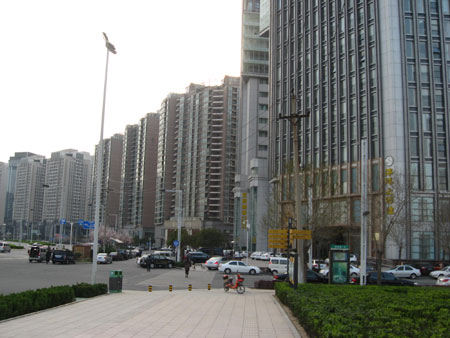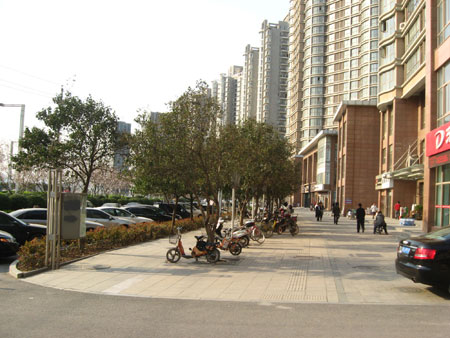nukavarapu wrote:
Interesting point of view ... but I have a few questions for you !!!
1.) A democratic china can afford to pay the same peanuts to its workers it is paying now?
Does Japan? Does Taiwan? Does South Korea? The danger is a China with the same per capita income as the rest of the Far East. Unless you truly believe that communism is a better system then it is inevitable that China will be wealthier if it ever democraticizes. That had been the universal experience in the Far East.
2.) Once a country becomes democratic and sheds its communist past, will the outburst kept compressed in people's mind for so many years, just disappear?
I am assuming that the outburst will be exercised in open violence and revolution in a China turning towards democracy. The chicoms won't give up power otherwise.
In open rebellion, the Americans will enter the fray. The Americans will brook no power vacuum, especially across the largest landmass in the Western Pacific which for all intents and purposes is an American lake.
3.) If a society gets freed from a complete suppression, will they immediately return to disciplined life at the very next day?
No, communism depends on discipline and slavery to be "successful" (as if being 10 times poorer than Japan is successful.) A free nation doesn't.
Think about this -- will it take longer than for the US to turn around Japan or South Korea after complete devastation? There is little chance of the destruction that we saw in those wars during a modern color or velvet revolution.
4.) People who were bullied by their own pseudo-elites will accept any form of interference from the West?
People bullied by their elite are exactly the ones who will ask for American intervention. Look at Libya. Those people beg for American intervention. The Far East worship the gora far more.
There is also the little thing called the internet where people know exactly the freedom and, even more importantly in the Far East, the wealth represented by the Americans and its allies.
If a revolution kicks off, there will be many asking for US support. There will be Chinese Americans pushing for intervention from the US end.
5.) In present days and in immediate future, does Ameerkhan has that kind of money to take care of the most populated country in the world, especially post-recession?
Americans will try and even if they do not succeed they will end up focusing the West and the Far East, the richest regions of the world, on a democratic China. That means China gets preferential access to markets, aid and everything else. Again, look at American support of Japan, South Korea and Taiwan.
In fact, if what things are pointing to, if China does become a democracy, there will be a huge journey to market and social corrections. It will be a big uncontrolled giant, with nobody to guide and very few to listen to. In such a bad shape, the priority would be to get a society super structure in place and its going to be a very rough ride. Forget about any threat or competition to India.
You are assuming that market (and social) corrections will harm a nation in the long or even medium term. Market corrections are what makes economies rational. They are what made democracies the wealthiest nations on earth. By a wide margin.
Irrational economies created under communism -- whether it is the Soviet Union in the past or North Korea and the PRC today -- are much poorer than than virtually every democratic neighbors.
And I doubt that whatever condition China would be in after a revolution would be any worse than Japan after WWII or South Korea after the Korean War. Those nations were remade after total devastation.
In the modern world, nations suffer much less in Color Revolutions. With China, a good chunk of its wealth is in American treasury bonds which won't be affected by revolution and will in fact be the money for the US to use in rebuilding a democratic China.
The US will be in effect using Chinese money to remake China under American influence and control.
Even the world economy put together cannot sustain an economically stirred and democratic china and rest assured nobody will like to feed this new democratic infant which has such a huge appetite.
The real problem is the world put together cannot sustain both a democratic China and a wealthy democratic India. With Americans stamping their mark on China, it might well mean that all resources flow towards China to the detriment of everyone else.
The reason China is the second largest economy in the world despite the massive corruption, inefficiency and irrationalities of its communist government is because Americans began opening its market and resources to China after Nixon's visit in 1970.
If China becomes a democracy, that effort becomes ten-fold.
The only thing that comes to my mind is the main land getting disintegrated into smaller land blocks as it was pre-Ming dynasty.
One, it doesn't matter if it remains one Chinese state or 10 of them. If they are democratic, they will be more economically rational, competitive and wealthy. Having 10 Japans will be massive competition.
Two, there is no way that the US will leave such a huge and critical landmass in a power vacuum and it will not let anyone else have influence there. Therefore it will attempt to rebuild China in its image.
Americans is connected to the Far East strategically. They fought three bloody wars there. Pulling China into its orbit would be the crowning achievement of all those previous wars. It will cement American power for centuries.
Americans did not become a superpower by acting passive or stupid. China in revolution would be a game changer that Americans will go all in and in all likelihood win. An American win will make the US even more powerful but Chinese much wealthier.
Now, as Indians we shouldn't want the game to change. China remaining communist not only retards its growth so it can be overtaken but also makes American spend its resources containing China instead of building it up.
A democratic China or many democratic Chinas under the US umbrella would make India redundant in the strategic space. It would also cause the US to support Chinese position. Remember Taiwan is free and democratic but its claims to the former Chinese empire is greater than even the PRC. On Taiwanese maps, Mongolia and chunks of Russia and India are still shown as Chinese.

